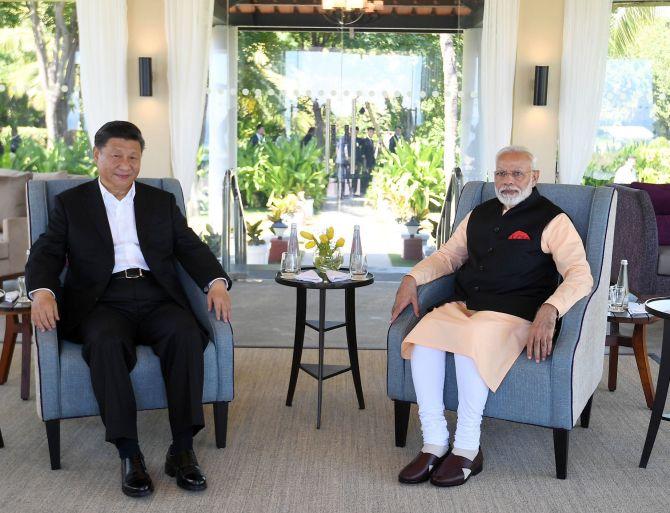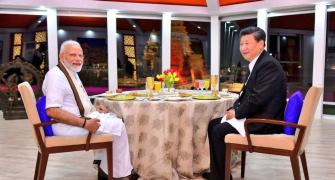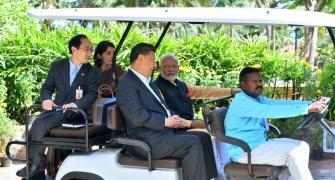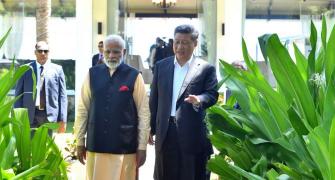'China physically occupies about 45,000 sq km of J&K as claimed by India, including 3,000 sq km captured in the 1962 War and never returned; and 5,180 sq km ceded to China by Pakistan in 1963.'
'It is hard to justify remaining silent about the return of China occupied Ladakh,' observes Ajay Shukla.

Notwithstanding the gushy media coverage, which even featured the detailed dinner menu, of the informal summit between Prime Minister Narendra Damodardas Modi and China's President Xi Jinping at Mamallapuram, this was hardly a breakthrough in the testy relations between the two countries.
If there was diplomatic success, it lay in New Delhi's forbearance in allowing the summit to take place at all.
A country less complaisant towards China might well have called off the summit three days before it happened, when Beijing, after Xi's meeting with Pakistan Prime Minister Imran Khan, publicly declared that China supported Pakistan's 'core concerns'.
This amounts to backing Islamabad's claim over all of Jammu and Kashmir and, in effect, the abandonment of Beijing's professed neutrality on the Kashmir dispute.
New Delhi's placid acceptance of this, without even a strongly worded rebuke, must have signalled to Xi that New Delhi desired the optics of a Modi-Xi summit far more than Beijing did.
This would have been confirmed during the summit when Modi silently heard out Xi's account of his meeting with Khan.
The key achievement of the summit, as prominently advertised by both sides, apparently was that Modi and Xi spent over five hours in one-on-one talks on global affairs, investment and trade, combating terrorism, tourism and people-to-people contacts.
Afterwards, Modi talked up the 'Chennai Connect' that, he felt, would usher in 'a new era' in Sino-Indian ties.
Xi declared these were 'heart-to-heart' conversations and that he and Modi were 'like real friends'.
However, experience teaches that an exchange of national visions between the leaders of two countries does not naturally pave the path to peace, especially when there exists a deep-rooted strategic rivalry between them.
Observers with a sense of history would recall the four-and-a-half hours of documented conversations between Mao Zedong and Jawaharlal Nehru in October 1954 in which the two leaders similarly discussed America's role in the region, the global environment and India's and China's place in it.
Yet, eight years later they were at war.
True, New Delhi has little choice but to diplomatically engage an increasingly powerful, wealthy and assertive Beijing.
However, it cannot be so distracted by the rhetoric of friendship and fraternity as to miss the fact that, since the first 'informal summit' at Wuhan last year, China has done nothing to allay India's key security or economic concerns.
The Indian Army has been unable to reduce a single soldier on the borders and our military's deployment posture remains predicated on the possibility of a two-front war.
We are no closer to resolving the Sino-Indian border dispute, with the Chinese continuing to stonewall even the first step towards that -- which is to exchange maps marked with each side's perceived alignment of the Line of Actual Control, the de facto border.
Recent delegations from influential Chinese think-tanks (which accurately reflect Beijing's official stance) have recited to Indian audiences the hackneyed formulation that a border solution 'should be left to future generations'. The official briefings after Chennai indicate that the Chinese stuck to the same line.
With little accommodation in the present, Xi's proposal for a 'hundred-year plan' for cementing ties between the two countries only kicks the can so far down the road that it ceases to be visible at all.
New Delhi's economic concerns remain unaddressed too, primarily its expanding $53 billion trade deficit with China and misgivings over the terms of the Regional Comprehensive Economic Partnership -- a gigantic free trade pact being negotiated between 16 countries that together constitute some 40% of the world's economy.
Here, too, the can has been kicked down the road, with a 'High-Level Economic and Trade Dialogue Mechanism' being set up to tackle these issues.
That this is merely a hastily-applied band-aid was tacitly acknowledged by Foreign Secretary Vijay Gokhale's admission: 'It was a brief discussion'.
The experience of previous committees warns us to temper expectations.
In the realm of border management, the Working Mechanism for Consultation and Coordination on India-China Border Affairs, signed in January 2012 and the Border Defence Cooperation Agreement, signed in October 2013, failed spectacularly to calm the Line of Actual Control.
Instead, there was a three-week-long standoff at Depsang, Ladakh, in April 2013 followed by a 16-day face-off at Chumar, Ladakh, in September 2014 and then the tense 73-day confrontation at Doklam, Bhutan, in June-August 2017.
The brief spell of peace on the LAC after Wuhan reverted inexorably to the scattered confrontations of earlier days.
Gokhale told the media that the two leaders did not discuss Kashmir as it is 'an internal matter' for India.
There was good reason to avoid discussing Kashmir, but it is, in fact, far from an internal matter.
China physically occupies about 45,000 square kilometres of J&K state as claimed by India, including 3,000 square kilometres captured in the 1962 War and never returned; and 5,180 square kilometres ceded to China by Pakistan in 1963.
If the only J&K issue that remains to be discussed with Pakistan is the return of Pakistan occupied Kashmir to India, it is hard to justify remaining silent about the return of China occupied Ladakh.
The concept of 'informal summits' seems here to stay, with Modi having already accepted Xi's invitation to come and chat next year in China.
However, there is little to be gained from a summit that is reduced to a spectacle and where competitive rhetoric far outpaces the reality.
If Modi was reduced to writing poetry, China's envoy to India Sun Weidong tweeted: 'From Wuhan to Chennai, from Yangtze river to Ganges, China and India join hands and stand together. Dragon and Elephant have a tango'.
Sun should have known that such saccharine descriptives sound patronising to Indians when China and India still stand far apart on so many issues.
For a dragon to ever tango with an elephant seems a long way from where we are now.










